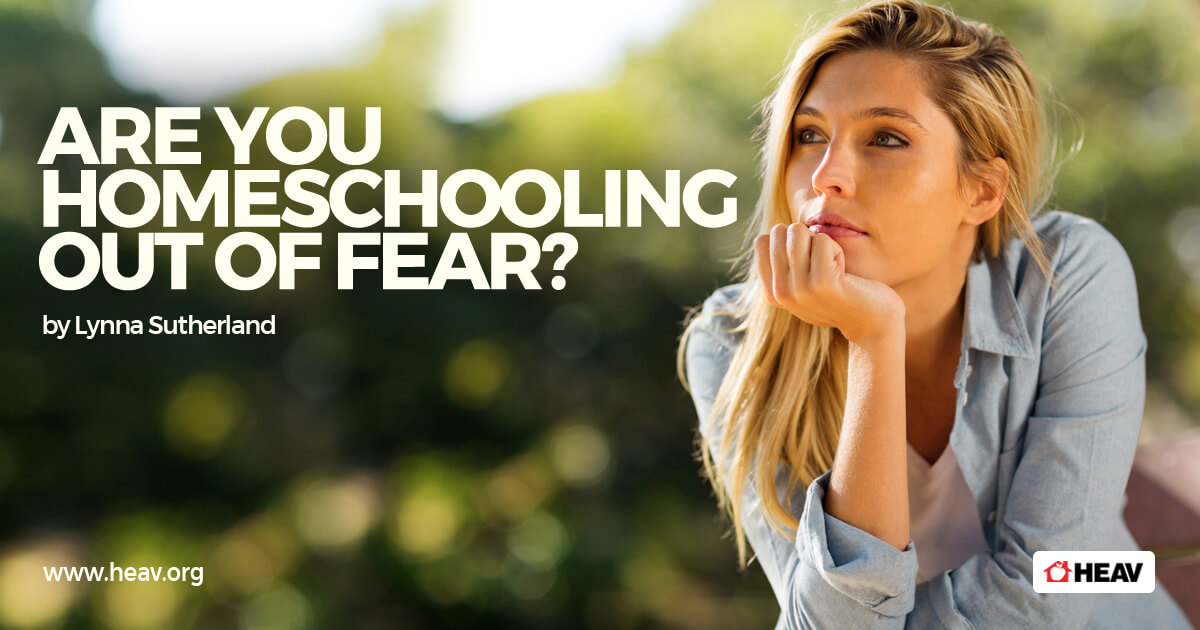Why Homeschool: Are You Homeschooling Out of Fear?
If there’s one thing I’ve heard over and over from veteran homeschoolers, it’s that we shouldn’t homeschool out of fear. That sounds like wise advice. Who wants to be motivated by fear? But what does that actually mean in practice?
Lynna Sutherland blogs at Homeschooling Without Training Wheels, where she loves to remind moms (and herself!) of the freedom and flexibility that come with homeschooling! Lynna and her husband have seven children. The motto of their homeschool is “Wisdom Is the Principal Thing” from Proverbs 4:7. You can also find Lynna on Instagram, Facebook and Pinterest. Lynna hosts a private Facebook group called Family Schooling without Training Wheels specifically for encouraging parents in multi-age homeschooling and outside-the-box approaches to meet the needs of their unique family.
The Problem
We homeschool for all kinds of reasons. Perhaps we’re concerned about the peer influences in the public school setting. Perhaps we’re worried that our children won’t be well educated in a traditional school setting. Perhaps our children have special needs that may not be accommodated in a large group. Many people start homeschooling “against” things. We homeschool because of what we don’t want. But this isn’t sustainable long-term. Homeschooling is a big job. A huge job. It takes lots of determination and lots of energy. And you just can’t derive that kind of energy from negative motivation. You can’t get out of bed every morning and put your feet on the floor, determined to homeschool with a happy heart, because of bad things that are or might be happening out there in the world. This is a sure-fire recipe for homeschool burnout. It’s also a likely set-up for resentment—resentment against your children, your spouse, even your community.The Appropriate Response
Concerns about alternatives to homeschool can be a nudge to consider homeschooling and a reason to make the initial leap. But in order to stay the course, you need to develop a positive, benefits-focused mindset. This is why lots of homeschooling books and speakers recommend developing your vision. Why are you homeschooling? Vision statements are always based on positive goals, not on the things you want to avoid. Instead, develop a positive vision. We homeschool …- To be able to personally disciple the next generation
- To focus on and develop family relationships
- To adapt learning to the needs of the family and individual children
- To develop a family culture
- To leave time for service opportunities or special interests
The Difference
I remember being involved in a discussion in an online forum where one contributor seemed to be overly eager to attribute every parenting concern or decision to “parenting out of fear.” Apparently she defined this as considering possible negative outcomes and seeking to prevent them. So are we parenting out of fear when we put our children in car seats or buy them bike helmets? Are we parenting out of fear when we limit the amount of candy they eat or soda they drink? Is it always wrong to take possible future consequences seriously and prepare accordingly? You don’t need to feel guilty if part of your motivation to homeschool is to avoid negative outcomes or protect your children from dangers you see in other educational models. The difference is in where you place your focus and how you measure success. You can’t gauge how well you’re avoiding theoretical negative peer influences. But you can take stock of relationships in your home and see where they need work. You can’t determine how well you’re avoiding a poor education in a school your children don’t attend. But you can evaluate growth and development in your real-life homeschool and the activities you choose to fill your time. When the going gets hard, what do you tell yourself? I’d encourage you to focus on the benefits of homeschooling rather than the dangers of the alternatives. Thankfulness and faithfulness are far better companions than fear on this journey!Lynna Sutherland blogs at Homeschooling Without Training Wheels, where she loves to remind moms (and herself!) of the freedom and flexibility that come with homeschooling! Lynna and her husband have seven children. The motto of their homeschool is “Wisdom Is the Principal Thing” from Proverbs 4:7. You can also find Lynna on Instagram, Facebook and Pinterest. Lynna hosts a private Facebook group called Family Schooling without Training Wheels specifically for encouraging parents in multi-age homeschooling and outside-the-box approaches to meet the needs of their unique family.









